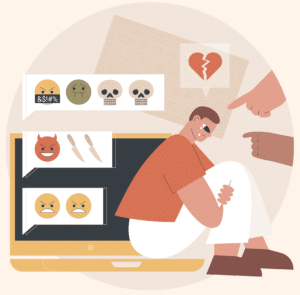Cyberbullying in Ireland
Cyberbullying is one of the most concerning threats facing our children today, and the problem is particularly acute here in Ireland. A 2020 study carried out by Dublin City University and the European Commission found that children in Ireland are more likely to be victims of this insidious form of harassment than children in any other country in the European Union, followed by Italy and Germany.
The rate of online harassment and bullying appears to have increased in recent times, as the move to online education made children more susceptible to harassment, and less able to avoid it by disconnecting, than ever before. This increased rate of harassment has been linked to self-harm and, in the most serious cases, suicidal ideation.
Through repeated lockdowns, children’s main methods of socialisation have moved online. While being connected to friends is extremely important, and online communications have made remote learning possible when schools were closed, more time spent on these forums increases the potential exposure of a child to online bullying and harassment and provides a bully with a wider potential audience for their actions.
Legislation which will aim to combat the rise of cyberbullying is currently under discussion in the Oireachtas, and several child safety groups have made excellent suggestions as to how this legislation should operate. However, the overall legal position on cyberbullying in Ireland is very unclear.
Until the exact parameters of the responsibility and authority of educators in relation to bullying in school are defined, schools, teachers and parents will not be able to develop effective strategies to comprehensively support the victims of bullying and deter the perpetrators.
It is crucial that the conversation surrounding bullying in school is brought to the fore and that stakeholders come together to ensure that prevention and response measures are embedded into school policy. With the increased prevalence of cyber bullying in recent times and some element of online learning likely to be part of children’s’ lives for the near future, immediate action is needed to allow those who care for them to protect them from this growing danger.
Derek Walsh, Partner in Litigation and Dispute Resolution of Sellors LLP provides advice to various individuals and organisations in respect of their duty of care with reference to bullying and cyberbullying. In relation to bullying at school, Derek notes that schools and parents should “be aware that this area of law is full of uncertainties but remember that schools do have a duty of care and if they are made aware of bullying taking place in school, they must act to stop it”.
If you have any questions about any of the issues raised in this article, or need any advice, please contact Derek Walsh at [email protected], or call our office at 061 414 355.


